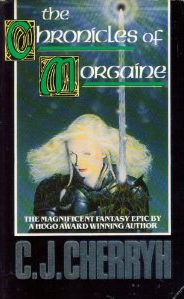C.J. Cherryh is one of my favourite writers. She’s very versatile and extremely prolific—she’s written science fiction and fantasy in many different worlds and styles. Gate of Ivrel (1976), Well of Shiuan (1978), Fires of Azeroth (1979 and Exile’s Gate (1988) have been published as the Chronicles of Morgaine and now as the Morgaine Saga. They’re early work, and they’re not where I’d suggest starting with Cherryh, but I like them. What they’re most similar to in feel is the Fortress books.
This is science fiction with a strong fantasy feel. Each book starts with the explanatory frame explanation, without which you couldn’t possibly guess at the wider situation. Briefly, the alien qhal discovered a gate on a moon by which they could travel instantly to other worlds. They built a system of gates and used them to travel not just in space but in time. Then someone went backwards in time and reality collapsed. Humans, who had been tangled by the qhal, discovered the gates and sent out a mission to close them and prevent reality collapsing further. Morgaine is the last survivor of this mission, and she’s grimly determind to keep on with it no matter what it takes.
Gate of Ivrel is told from the point of view of Vanye, who Morgaine claims under the custom of ilyn, which makes him her servant for a year. From Vanye’s perspective, a hundred years before Morgaine appeared on his world and led an army into nothing—they vanished—and then she vanished herself. From hers, it has been an eyeblink.
The good thing about these books is the cultures and the effects of time and Morgaine on them. The hundred years in Gate of Ivrel becomes a thousand on the world of Well of Shiuan, where the survivors of the lost army have legends about their home and Morgaine. The cultures and expectations of the cultures are very solid. The dilemmas feel very real. Morgaine is relentless but she’s also on the side of good, closing the gates and preventing all reality from imploding really is more important than ethics—and this is one of the things that makes the stories feel like fantasy, that kind of absolute is a staple of fantasy and rare in SF.
If the qhal were the technologically advanced race we’re told they were, why is every single one of the worlds we see feudal and at a medieval tech level, even the ones where there’s been no influence? The only tech we see is what Morgaine carries, and the only tech that’s ever working anywhere is the Gates. I can believe in gates that let you step between worlds, and even ones that let you step between times—people are always saying this about FTL anyway—but the ability to memorize someone and recreate them as they were but with their memory, and to transfer personality between bodies, seems an odd thing to go with that. It makes them seem more fantasy-like, and allows the whole theme of possession and identity, but the more I think about it the less comfortable I am with it.
The cultures on the different worlds are all different but all solid and plausible. We see Andur-Kursh where qhal are killed on sight and considered witches. We then see Shiuan where the remnants of the lost army are either outright enslaved or barely independent of halfling khal. Then we see Shathan which is a land at peace, with men and qhal living in (feudal) harmony and the power of the gates being used for good—and Morgaine still has to close the gate, after having brought havoc with her from Shiuan. And then in Exile’s Gate we see a world with humans losing to qhal.
Real spoilers now—the first three books deal with the tormented Liell/Roh, who has taken over body after body and whose early memories are bad dreams of Morgaine, who wants to be Roh and yet can’t completely resist what else he is. The first three are one story, the consequences of the hundred-year ago battle in Andur-Kursh, as they spread across three worlds. All three of the protagonists are tormented—Vanye by his oath, Morgaine by her relentless need to close gates, and Roh by his possession. They also seldom have a breathing space, and Vanye goes through horses like candy. The weather is usually awful. There are enemies all around and nobody can trust anyone.
And that’s the problem with these books—they’re too grim. They’re good, but they’re also unrelievedly dark. The effect of reading all four of them together made me feel really down. I recommend spacing them with something lighter and fluffier.
Jo Walton is a science fiction and fantasy writer. She’s published eight novels, most recently Half a Crown and Lifelode, and two poetry collections. She reads a lot, and blogs about it here regularly. She comes from Wales but lives in Montreal where the food and books are more varied.










